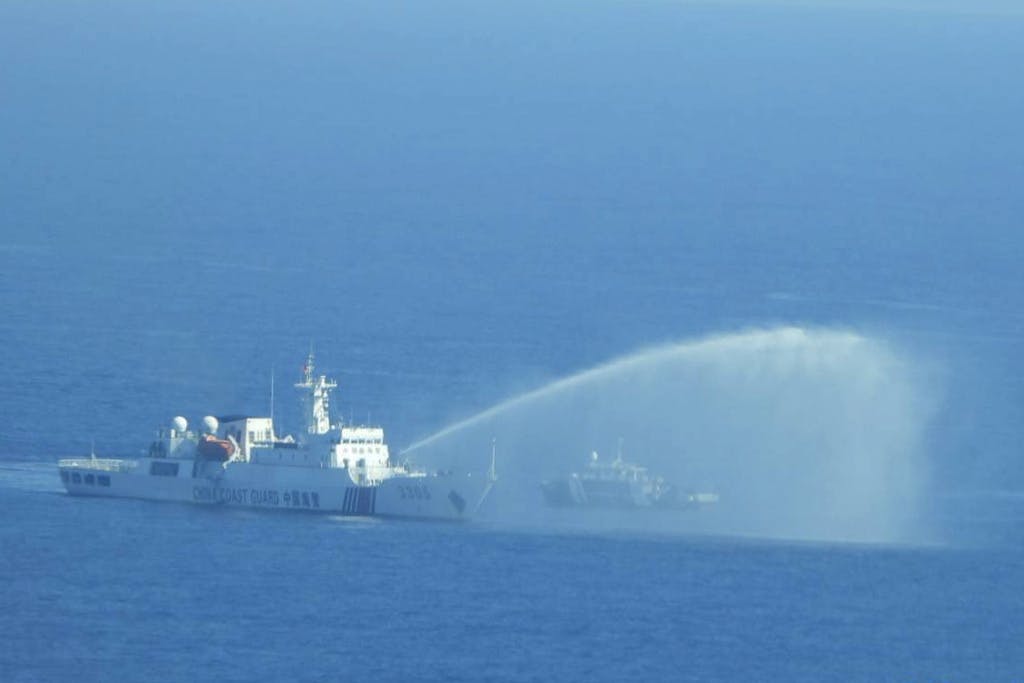In David and Goliath Contest, Philippines Stands Up for Its Rights at Sea, Yet Proves No Match for Might of Communist China
Washington decries ‘disregard’ for ‘international law,’ yet shows little willingness to back up its Philippine ally with more than words.

In a David and Goliath contest, the Philippines is trying to stand up against Beijing but is no match for Communist Chinese power in the South China Sea.
That much is plain from images of Chinese Coast Guard vessels pursuing Philippine fishing boats, chasing them away from the fish-rich Scarborough shoal 150 miles west of Manila. The Chinese have had no problem bullying the fishermen with blasts from water cannons fortifying their claim to the entire South China Sea.
“These actions reflect not only reckless disregard for the safety and livelihoods of Filipinos, but also for international law,” said the State Department, but Washington faces the issue of its willingness to back up its Philippine ally with more than words.
At stake is an alliance in which American forces are returning to the Philippines after the Americans withdrew from their huge air force and naval bases more than 30 years ago.
The American ambassador to the Philippines, Mary Kay Carlson, has accused China of undermining regional stability “in defiance of a free and open Indo-Pacific,” but the powerful American navy and air force are nowhere in sight, and no one is talking about the Americans standing up for weak Philippine forces in a showdown.
The Chinese, meanwhile, are supporting their assault on Philippine boats with what the Beijing mouthpiece, Global Times, dexterously called “restriction measures.” Philippine vessels “again trespassed into waters off a Chinese reef,” it said, accusing the Philippines of “breaking a tacit understanding with China” and “also the US for fueling the Philippines’ audacity of provocations.”
On Monday, a Chinese military spokesman said “no third party” —meaning Washington — “has the right to intervene” in what he called “issues between the two countries.”
American warplanes occasionally do challenge Chinese claims to the South China Sea by flying through what the Chinese regard as their air space, and American warships have even cruised close to islets where the Chinese have built bases complete with air strips. When it comes to escorting or defending Philippine fishing boats, however, the Americans are neither seen nor heard.
The standoff extends south to the Spratly Islands, a group of more than 100 islets about 200 miles west of the southern Philippine that are claimed variously by Taiwan, Vietnam, Malaysia, and Brunei as well as China. The Philippines has sought to stake its claim by grounding a vessel on one of the islets, but the Chinese blocked a Philippine vessel from going there.
In a case of who rammed whom, the Chinese accused the Philippine vessel of having “internationally rammed” one of its Coast Guard vessels, “resulting in a minor collision,” and the Philippines said the Chinese had caused “severe engine damage” by ramming the Philippine vessel. The Chinese accused the Philippines of attempting to send “building material” to expand its tenuous grip on the islet.
The Philippines president, Ferdinand “Bongbong” Marcos Jr., has sought to head off a shooting war with China that the Philippines’ feeble forces would surely lose without strong foreign intervention. After meeting President Xi on the sidelines of the Asia-Pacific Economic Cooperation gabfest at San Francisco last month, Mr. Marcos said he was “trying to maintain the peace,” but after the latest episode he remained “undeterred.”
While the Americans were silent about military intervention, Marcos got an assurance of support from an unlikely friend — Japan, the country that occupied the Philippines in World War II, slaughtering thousands of Filipinos.
Japan’s prime minister, Fumio Kishida, in the first address ever by a Japanese leader to the Philippine congress, assured the Philippines that “trilateral cooperation to protect the freedom of the sea is underway.” Washington has joined Japan and the Philippines in recent exercises in the South China Sea — a portent, perhaps, of much more serious cooperation in defense of Philippine interests.

